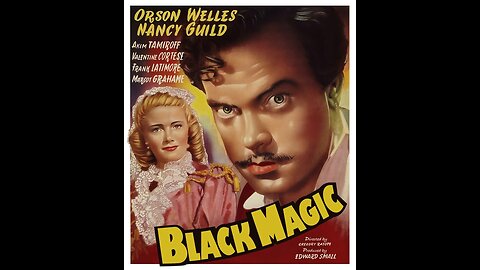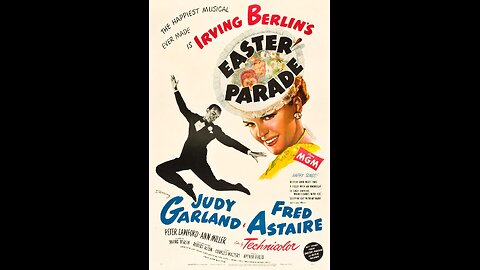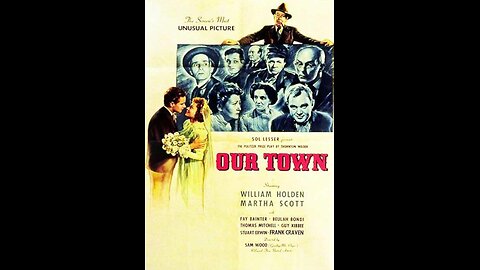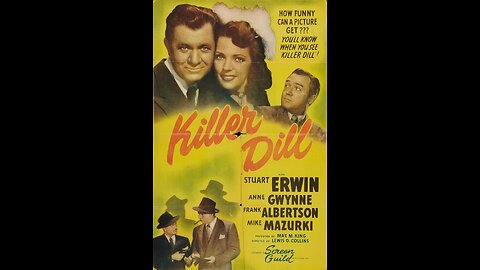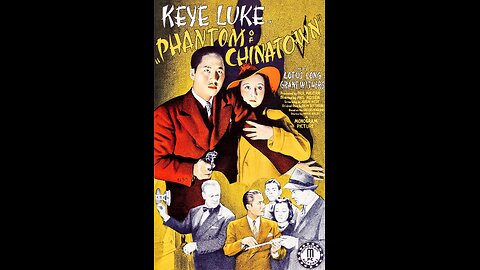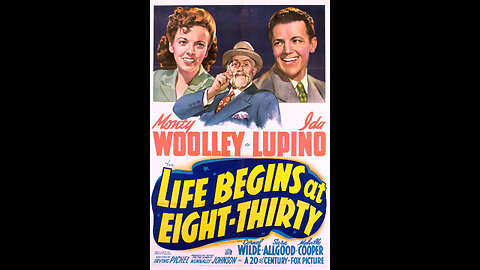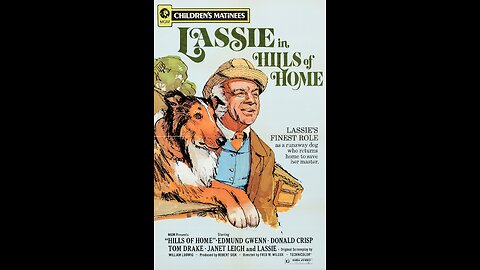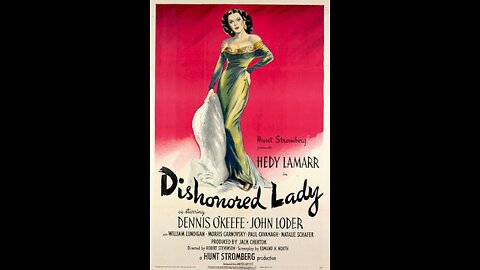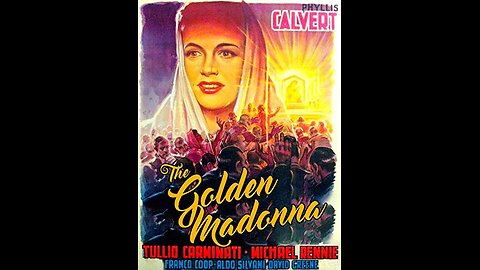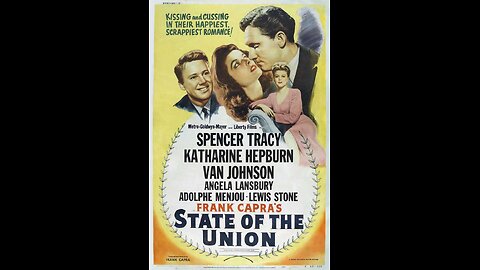
1940-1949 Movies
458 videos
Updated 2 days ago
The Best of Anglo American Films from 1940-1949
-
State of the Union (1948) | Directed by Frank Capra
 Classic Films & Movies Archive"State of the Union" is a political drama centered on Grant Matthews, a wealthy and idealistic businessman who is persuaded to run for President of the United States. As his campaign gains traction, he becomes increasingly entangled in political compromises and manipulations, drifting away from his values and his estranged wife, Mary. Ultimately, it is Mary who reminds him of his original ideals, forcing him to confront the true cost of political ambition and the importance of personal integrity. Genre: Drama, Political, Romance Frank Capra was one of America's most influential and celebrated film directors, known for his optimistic, populist themes and strong belief in the decency of the common man. An Italian immigrant, Capra rose to fame in the 1930s and 1940s with iconic films such as "It Happened One Night," "Mr. Smith Goes to Washington," and "It's a Wonderful Life." His films often portrayed individuals standing up against powerful institutions and remain classics of American cinema. Star Cast: - Spencer Tracy as Grant Matthews - Katharine Hepburn as Mary Matthews - Van Johnson as Spike McManus - Angela Lansbury as Kay Thorndyke - Adolphe Menjou as Jim Conover - Lewis Stone as Sam Thorndyke "State of the Union" was well received by critics for its intelligent script and timely exploration of American politics. Audiences appreciated its combination of political commentary and emotional depth, particularly the chemistry between Spencer Tracy and Katharine Hepburn. While not as commercially successful as some of Capra’s earlier films, it was praised for its relevance, wit, and strong performances. Fun Facts: - This was the only film Frank Capra directed for MGM, and it reunited him with Spencer Tracy and Katharine Hepburn for the first time. - The film was based on the 1945 play of the same name by Howard Lindsay and Russel Crouse, which was a Broadway success. - Angela Lansbury plays an unusually unsympathetic role as a powerful media mogul and political manipulator, showcasing her range beyond the typical ingenue roles of the era. - The movie offers a rare behind-the-scenes look at presidential politics in the post-war period, reflecting anxieties about media influence and political integrity. * This Rumble Movie Channel is comprehensively indexed on https://kinoquick.com - find you favourite movies fast & free! * Follow this channel to be notified of daily movie updates.159 views
Classic Films & Movies Archive"State of the Union" is a political drama centered on Grant Matthews, a wealthy and idealistic businessman who is persuaded to run for President of the United States. As his campaign gains traction, he becomes increasingly entangled in political compromises and manipulations, drifting away from his values and his estranged wife, Mary. Ultimately, it is Mary who reminds him of his original ideals, forcing him to confront the true cost of political ambition and the importance of personal integrity. Genre: Drama, Political, Romance Frank Capra was one of America's most influential and celebrated film directors, known for his optimistic, populist themes and strong belief in the decency of the common man. An Italian immigrant, Capra rose to fame in the 1930s and 1940s with iconic films such as "It Happened One Night," "Mr. Smith Goes to Washington," and "It's a Wonderful Life." His films often portrayed individuals standing up against powerful institutions and remain classics of American cinema. Star Cast: - Spencer Tracy as Grant Matthews - Katharine Hepburn as Mary Matthews - Van Johnson as Spike McManus - Angela Lansbury as Kay Thorndyke - Adolphe Menjou as Jim Conover - Lewis Stone as Sam Thorndyke "State of the Union" was well received by critics for its intelligent script and timely exploration of American politics. Audiences appreciated its combination of political commentary and emotional depth, particularly the chemistry between Spencer Tracy and Katharine Hepburn. While not as commercially successful as some of Capra’s earlier films, it was praised for its relevance, wit, and strong performances. Fun Facts: - This was the only film Frank Capra directed for MGM, and it reunited him with Spencer Tracy and Katharine Hepburn for the first time. - The film was based on the 1945 play of the same name by Howard Lindsay and Russel Crouse, which was a Broadway success. - Angela Lansbury plays an unusually unsympathetic role as a powerful media mogul and political manipulator, showcasing her range beyond the typical ingenue roles of the era. - The movie offers a rare behind-the-scenes look at presidential politics in the post-war period, reflecting anxieties about media influence and political integrity. * This Rumble Movie Channel is comprehensively indexed on https://kinoquick.com - find you favourite movies fast & free! * Follow this channel to be notified of daily movie updates.159 views -
Black Magic (1949) | Directed by Gregory Ratoff
 Classic Films & Movies ArchiveBlack Magic is a historical drama based on the life of the notorious hypnotist and charlatan Cagliostro. Set against the backdrop of pre-revolutionary France, the story follows Cagliostro’s rise from a troubled youth to a powerful figure who manipulates nobles and commoners alike, ultimately becoming entangled in political conspiracies. Genre: Historical Drama, Adventure Director: Gregory Ratoff Gregory Ratoff was a Russian-born actor, director, and producer who became a prominent figure in Hollywood during the 1930s and 1940s. Originally an actor on the New York stage, Ratoff transitioned into film where he directed several successful movies. Known for his energetic style and versatility, he worked across genres, from comedies to serious dramas. His work often reflected a strong narrative drive and bold characterizations. Star Cast: - Orson Welles as Cagliostro - Nancy Guild as Lorenza - Akim Tamiroff as Gitano - Valentina Cortese as Marie Antoinette - Frank Latimore as Gilbert de Rezel - Stephen Bekassy as Louis XVI - Berry Kroeger as De Montagne At the time of its release, Black Magic received mixed reviews. Audiences were intrigued by the dramatic subject matter and Orson Welles' commanding performance, but some critics felt that the film was uneven and overly melodramatic. Nonetheless, it developed a modest following, particularly among fans of Welles’ theatrical style. Over time, it has gained a reputation as an interesting, if flawed, historical drama showcasing Welles' charismatic presence. Fun Facts: - Orson Welles not only starred in the film but was deeply involved behind the scenes, reportedly assisting in directing several key sequences. - Black Magic was filmed in Italy, taking advantage of the elaborate historical settings and postwar European studio resources. - The story is loosely based on Alexandre Dumas' novel "Joseph Balsamo," which romanticizes the life of Cagliostro. - Due to postwar restrictions, much of the film's production relied on European actors and crew members, giving it a distinctively continental flavor compared to typical Hollywood productions. - The film's elaborate costumes and set designs were praised, contributing significantly to the atmosphere despite a limited budget. * This Rumble Movie Channel is comprehensively indexed on https://kinoquick.com - find you favourite movies fast & free! * Follow this channel to be notified of daily movie updates.255 views
Classic Films & Movies ArchiveBlack Magic is a historical drama based on the life of the notorious hypnotist and charlatan Cagliostro. Set against the backdrop of pre-revolutionary France, the story follows Cagliostro’s rise from a troubled youth to a powerful figure who manipulates nobles and commoners alike, ultimately becoming entangled in political conspiracies. Genre: Historical Drama, Adventure Director: Gregory Ratoff Gregory Ratoff was a Russian-born actor, director, and producer who became a prominent figure in Hollywood during the 1930s and 1940s. Originally an actor on the New York stage, Ratoff transitioned into film where he directed several successful movies. Known for his energetic style and versatility, he worked across genres, from comedies to serious dramas. His work often reflected a strong narrative drive and bold characterizations. Star Cast: - Orson Welles as Cagliostro - Nancy Guild as Lorenza - Akim Tamiroff as Gitano - Valentina Cortese as Marie Antoinette - Frank Latimore as Gilbert de Rezel - Stephen Bekassy as Louis XVI - Berry Kroeger as De Montagne At the time of its release, Black Magic received mixed reviews. Audiences were intrigued by the dramatic subject matter and Orson Welles' commanding performance, but some critics felt that the film was uneven and overly melodramatic. Nonetheless, it developed a modest following, particularly among fans of Welles’ theatrical style. Over time, it has gained a reputation as an interesting, if flawed, historical drama showcasing Welles' charismatic presence. Fun Facts: - Orson Welles not only starred in the film but was deeply involved behind the scenes, reportedly assisting in directing several key sequences. - Black Magic was filmed in Italy, taking advantage of the elaborate historical settings and postwar European studio resources. - The story is loosely based on Alexandre Dumas' novel "Joseph Balsamo," which romanticizes the life of Cagliostro. - Due to postwar restrictions, much of the film's production relied on European actors and crew members, giving it a distinctively continental flavor compared to typical Hollywood productions. - The film's elaborate costumes and set designs were praised, contributing significantly to the atmosphere despite a limited budget. * This Rumble Movie Channel is comprehensively indexed on https://kinoquick.com - find you favourite movies fast & free! * Follow this channel to be notified of daily movie updates.255 views -
Easter Parade (1948) | Directed by Charles Walters
 Classic Films & Movies ArchiveEaster Parade is a vibrant musical set around the holiday traditions of early 20th-century New York. The story follows Don Hewes, a Broadway star who is left without a dance partner when his longtime partner leaves him for another career opportunity. Determined to prove he can make any dancer a star, he picks a chorus girl, Hannah Brown, and trains her for the stage. Through their journey of rehearsals, performances, and romantic entanglements, the two discover both professional success and personal affection. Genre: Musical, Romance, Comedy Director: Charles Walters Charles Walters was an American director and choreographer best known for his work on MGM musicals during Hollywood’s Golden Age. Originally a dancer on Broadway and in films, Walters transitioned to directing and became known for his light touch, ability to stage intricate dance numbers, and bringing warmth and charm to his projects. His other notable works include Lili (1953), Dangerous When Wet (1953), and High Society (1956). Walters had a talent for working with major stars and crafting musicals that combined strong storytelling with dazzling production numbers. Star Cast: - Judy Garland as Hannah Brown - Fred Astaire as Don Hewes - Peter Lawford as Jonathan Harrow III - Ann Miller as Nadine Hale - Jules Munshin as François - Clinton Sundberg as Mike the Bartender - Richard Beavers as Vance - Johnny Green and His Orchestra Easter Parade was a major critical and commercial success upon its release. Audiences loved the pairing of Fred Astaire and Judy Garland, and the film became the highest-grossing musical of 1948. Critics praised the film’s lush Technicolor presentation, memorable Irving Berlin songs, and the chemistry between the two leads. Fred Astaire’s return to film after a brief retirement added additional buzz to the film’s popularity. Fun Facts: - Easter Parade marked Fred Astaire’s comeback after initially retiring from film dancing two years earlier. He replaced Gene Kelly, who was originally cast but broke his ankle before shooting began. - The movie features classic Irving Berlin songs, including "Steppin' Out with My Baby" and "Shakin' the Blues Away." - Judy Garland was at the height of her career, and her charm and comedic timing were major highlights of the film. - Ann Miller’s dazzling tap dance performance of "Shakin' the Blues Away" became one of her signature moments on film. - The title and several scenes were inspired by New York City’s famous Easter Parade along Fifth Avenue. * This Rumble Movie Channel is comprehensively indexed on https://kinoquick.com - find you favourite movies fast & free! * Follow this channel to be notified of daily movie updates.140 views
Classic Films & Movies ArchiveEaster Parade is a vibrant musical set around the holiday traditions of early 20th-century New York. The story follows Don Hewes, a Broadway star who is left without a dance partner when his longtime partner leaves him for another career opportunity. Determined to prove he can make any dancer a star, he picks a chorus girl, Hannah Brown, and trains her for the stage. Through their journey of rehearsals, performances, and romantic entanglements, the two discover both professional success and personal affection. Genre: Musical, Romance, Comedy Director: Charles Walters Charles Walters was an American director and choreographer best known for his work on MGM musicals during Hollywood’s Golden Age. Originally a dancer on Broadway and in films, Walters transitioned to directing and became known for his light touch, ability to stage intricate dance numbers, and bringing warmth and charm to his projects. His other notable works include Lili (1953), Dangerous When Wet (1953), and High Society (1956). Walters had a talent for working with major stars and crafting musicals that combined strong storytelling with dazzling production numbers. Star Cast: - Judy Garland as Hannah Brown - Fred Astaire as Don Hewes - Peter Lawford as Jonathan Harrow III - Ann Miller as Nadine Hale - Jules Munshin as François - Clinton Sundberg as Mike the Bartender - Richard Beavers as Vance - Johnny Green and His Orchestra Easter Parade was a major critical and commercial success upon its release. Audiences loved the pairing of Fred Astaire and Judy Garland, and the film became the highest-grossing musical of 1948. Critics praised the film’s lush Technicolor presentation, memorable Irving Berlin songs, and the chemistry between the two leads. Fred Astaire’s return to film after a brief retirement added additional buzz to the film’s popularity. Fun Facts: - Easter Parade marked Fred Astaire’s comeback after initially retiring from film dancing two years earlier. He replaced Gene Kelly, who was originally cast but broke his ankle before shooting began. - The movie features classic Irving Berlin songs, including "Steppin' Out with My Baby" and "Shakin' the Blues Away." - Judy Garland was at the height of her career, and her charm and comedic timing were major highlights of the film. - Ann Miller’s dazzling tap dance performance of "Shakin' the Blues Away" became one of her signature moments on film. - The title and several scenes were inspired by New York City’s famous Easter Parade along Fifth Avenue. * This Rumble Movie Channel is comprehensively indexed on https://kinoquick.com - find you favourite movies fast & free! * Follow this channel to be notified of daily movie updates.140 views -
Our Town (1940) | Directed by Sam Wood
 Classic Films & Movies ArchiveOur Town is a poignant drama based on Thornton Wilder’s Pulitzer Prize-winning play of the same name. Set in the fictional small town of Grover’s Corners, New Hampshire, the film follows the simple lives of its residents, focusing on the love story between George Gibbs and Emily Webb. Narrated by the Stage Manager, who breaks the fourth wall and offers reflections on time, change, and mortality, the story is a meditation on the beauty of everyday life and the fleeting nature of human experience. Genre: Drama, Romance Director: Sam Wood Sam Wood was a successful and versatile American film director known for his work in both drama and comedy during the 1930s and 1940s. He directed a number of well-regarded films, including Goodbye, Mr. Chips and Kings Row. Wood had a clear, classical directing style that emphasized character and story over visual flair. His films often conveyed strong emotional themes and moral values, making him a dependable studio craftsman in Hollywood’s Golden Age. Star Cast: - William Holden as George Gibbs - Martha Scott as Emily Webb - Fay Bainter as Mrs. Gibbs - Beulah Bondi as Mrs. Webb - Thomas Mitchell as Mr. Webb - Guy Kibbee as Mr. Gibbs - Frank Craven as the Stage Manager Our Town was well received by audiences and critics for its heartfelt storytelling and faithful adaptation of Wilder’s play. The film captured the simplicity and sincerity of small-town American life, though it altered the play’s famously somber ending to suit cinematic tastes of the time. Martha Scott, reprising her Broadway role, earned an Academy Award nomination for Best Actress. The film was also nominated for Best Picture and several other awards. It remains a moving and nostalgic portrayal of love, community, and the passage of time. Fun Facts: - The film adaptation softened the play’s original ending, giving it a more optimistic resolution, which was controversial among some critics and fans of the stage version. - Martha Scott and Frank Craven both appeared in the original Broadway production and recreated their roles for the screen. - This was one of William Holden’s earliest starring roles and helped establish his career in Hollywood. - The film’s narration and structure preserve the unique theatrical style of the play, with the Stage Manager guiding viewers through time and space. - Our Town continues to be widely performed on stage and studied in schools, making it one of the most enduring works of American theater. Our Town (1940) stands as a quiet yet powerful tribute to the value of ordinary life, reminding audiences that even the smallest moments hold great meaning when viewed through the lens of memory and love. * This Rumble Movie Channel is comprehensively indexed on https://kinoquick.com - find you favourite movies fast & free! * Follow this channel to be notified of daily movie updates.293 views
Classic Films & Movies ArchiveOur Town is a poignant drama based on Thornton Wilder’s Pulitzer Prize-winning play of the same name. Set in the fictional small town of Grover’s Corners, New Hampshire, the film follows the simple lives of its residents, focusing on the love story between George Gibbs and Emily Webb. Narrated by the Stage Manager, who breaks the fourth wall and offers reflections on time, change, and mortality, the story is a meditation on the beauty of everyday life and the fleeting nature of human experience. Genre: Drama, Romance Director: Sam Wood Sam Wood was a successful and versatile American film director known for his work in both drama and comedy during the 1930s and 1940s. He directed a number of well-regarded films, including Goodbye, Mr. Chips and Kings Row. Wood had a clear, classical directing style that emphasized character and story over visual flair. His films often conveyed strong emotional themes and moral values, making him a dependable studio craftsman in Hollywood’s Golden Age. Star Cast: - William Holden as George Gibbs - Martha Scott as Emily Webb - Fay Bainter as Mrs. Gibbs - Beulah Bondi as Mrs. Webb - Thomas Mitchell as Mr. Webb - Guy Kibbee as Mr. Gibbs - Frank Craven as the Stage Manager Our Town was well received by audiences and critics for its heartfelt storytelling and faithful adaptation of Wilder’s play. The film captured the simplicity and sincerity of small-town American life, though it altered the play’s famously somber ending to suit cinematic tastes of the time. Martha Scott, reprising her Broadway role, earned an Academy Award nomination for Best Actress. The film was also nominated for Best Picture and several other awards. It remains a moving and nostalgic portrayal of love, community, and the passage of time. Fun Facts: - The film adaptation softened the play’s original ending, giving it a more optimistic resolution, which was controversial among some critics and fans of the stage version. - Martha Scott and Frank Craven both appeared in the original Broadway production and recreated their roles for the screen. - This was one of William Holden’s earliest starring roles and helped establish his career in Hollywood. - The film’s narration and structure preserve the unique theatrical style of the play, with the Stage Manager guiding viewers through time and space. - Our Town continues to be widely performed on stage and studied in schools, making it one of the most enduring works of American theater. Our Town (1940) stands as a quiet yet powerful tribute to the value of ordinary life, reminding audiences that even the smallest moments hold great meaning when viewed through the lens of memory and love. * This Rumble Movie Channel is comprehensively indexed on https://kinoquick.com - find you favourite movies fast & free! * Follow this channel to be notified of daily movie updates.293 views -
Killer Dill (1947) | Directed by Lewis D. Collins
 Classic Films & Movies ArchiveKiller Dill is a crime comedy set in the Prohibition era, where a mild-mannered lingerie salesman named Johnny Dill accidentally gains a reputation as a notorious gangster. When Johnny tries to impress his love interest by acting tough, a series of misunderstandings and coincidences lead everyone to believe he’s a ruthless mobster. Things spiral out of control as rival gangsters, the press, and law enforcement get involved, and Johnny must find a way to clear his name and return to his ordinary life. Genre: Comedy, Crime Director: Lewis D. Collins Lewis D. Collins was an American director best known for his work in serials and B-movies during the 1930s and 1940s. His career was defined by fast-paced storytelling and workmanlike efficiency, often directing action, adventure, and crime films. Though not a major name in Hollywood, Collins had a solid reputation for delivering entertaining low-budget pictures and was a reliable figure in Republic and Universal studios' rosters. Star Cast: - Stuart Erwin as Johnny Dill - Anne Gwynne as Judy Parker - Frank Albertson as William T. Allen - Milburn Stone as Big Nick Moronie - Eduard Franz as Maboose - Dorothy Granger as Mabel - Mike Mazurki as Louie Killer Dill was received as a lighthearted and amusing comedy, offering postwar audiences a satirical take on gangster films. Stuart Erwin’s performance as the hapless hero won praise for its comic timing, and the film’s playful take on 1920s crime tropes provided good-natured entertainment. Though not a major release, it developed a modest following among fans of vintage crime comedies. Fun Facts: - The film's title is a pun on the name “John Dillinger,” the infamous real-life gangster of the 1930s. - Stuart Erwin, best known for playing bumbling everyman roles, leaned into his typecasting for the role of Johnny Dill with charming effect. - The movie blends gangster clichés with slapstick humor, spoofing both the crime genre and male bravado. - Anne Gwynne, who plays the romantic lead, was a popular pin-up girl during World War II and frequently appeared in Universal horror and mystery films. - The film is sometimes categorized as a screwball comedy due to its rapid-fire dialogue and mistaken identity plot. Killer Dill (1947) is a charming and tongue-in-cheek send-up of gangster melodramas, offering audiences a comical twist on the tough-guy archetype with a story that combines romance, mistaken identity, and a touch of slapstick flair. * This Rumble Movie Channel is comprehensively indexed on https://kinoquick.com - find you favourite movies fast & free! * Follow this channel to be notified of daily movie updates.209 views
Classic Films & Movies ArchiveKiller Dill is a crime comedy set in the Prohibition era, where a mild-mannered lingerie salesman named Johnny Dill accidentally gains a reputation as a notorious gangster. When Johnny tries to impress his love interest by acting tough, a series of misunderstandings and coincidences lead everyone to believe he’s a ruthless mobster. Things spiral out of control as rival gangsters, the press, and law enforcement get involved, and Johnny must find a way to clear his name and return to his ordinary life. Genre: Comedy, Crime Director: Lewis D. Collins Lewis D. Collins was an American director best known for his work in serials and B-movies during the 1930s and 1940s. His career was defined by fast-paced storytelling and workmanlike efficiency, often directing action, adventure, and crime films. Though not a major name in Hollywood, Collins had a solid reputation for delivering entertaining low-budget pictures and was a reliable figure in Republic and Universal studios' rosters. Star Cast: - Stuart Erwin as Johnny Dill - Anne Gwynne as Judy Parker - Frank Albertson as William T. Allen - Milburn Stone as Big Nick Moronie - Eduard Franz as Maboose - Dorothy Granger as Mabel - Mike Mazurki as Louie Killer Dill was received as a lighthearted and amusing comedy, offering postwar audiences a satirical take on gangster films. Stuart Erwin’s performance as the hapless hero won praise for its comic timing, and the film’s playful take on 1920s crime tropes provided good-natured entertainment. Though not a major release, it developed a modest following among fans of vintage crime comedies. Fun Facts: - The film's title is a pun on the name “John Dillinger,” the infamous real-life gangster of the 1930s. - Stuart Erwin, best known for playing bumbling everyman roles, leaned into his typecasting for the role of Johnny Dill with charming effect. - The movie blends gangster clichés with slapstick humor, spoofing both the crime genre and male bravado. - Anne Gwynne, who plays the romantic lead, was a popular pin-up girl during World War II and frequently appeared in Universal horror and mystery films. - The film is sometimes categorized as a screwball comedy due to its rapid-fire dialogue and mistaken identity plot. Killer Dill (1947) is a charming and tongue-in-cheek send-up of gangster melodramas, offering audiences a comical twist on the tough-guy archetype with a story that combines romance, mistaken identity, and a touch of slapstick flair. * This Rumble Movie Channel is comprehensively indexed on https://kinoquick.com - find you favourite movies fast & free! * Follow this channel to be notified of daily movie updates.209 views -
Phantom of Chinatown (1940) | Directed by Phil Rosen
 Classic Films & Movies ArchivePhantom of Chinatown is a mystery-adventure film and the final entry in the "Mr. Wong" detective series. Unlike previous installments featuring Boris Karloff as the titular sleuth, this film introduces Keye Luke as the lead, playing detective James Lee Wong. The plot follows Wong as he investigates the sudden death of an archaeologist who had just returned from a dig in Asia with a secret scroll. The search for a hidden tomb and a legendary treasure leads to murder, deception, and a climactic reveal in San Francisco’s Chinatown. Genre: Mystery, Crime, Adventure Director: Phil Rosen Phil Rosen was a veteran director of low-budget films during the 1920s through the 1940s. Known for his prolific output, Rosen specialized in crime dramas and mysteries, often working within tight budgets and schedules. He directed numerous entries in detective series like Charlie Chan and Mr. Wong. While his work rarely received mainstream acclaim, he was respected for his efficiency and ability to create suspenseful stories in the B-movie tradition. Star Cast: - Keye Luke as James Lee Wong - Grant Withers as Captain Street - Lotus Long as Win Len - Huntley Gordon as Dr. Benton - Charles Miller as Mason - Frank Lackteen as Jonas Phantom of Chinatown was notable for breaking ground by casting Keye Luke, a Chinese-American actor, as the lead detective—something rarely seen in Hollywood at the time. Although a B-picture with limited release, it was appreciated by audiences for its brisk pacing and atmospheric setting. Mystery fans found it a satisfying, if modest, whodunit with exotic intrigue. The film remains of historical interest for reversing the usual racial casting trend in early detective films. Fun Facts: - This was the sixth and final film in the Mr. Wong series, and the only one where the lead role was played by an Asian actor. - Keye Luke had previously portrayed Charlie Chan’s son in the Charlie Chan film series and was one of the few Asian-American stars in 1930s–40s Hollywood. - The story involved archaeological mysteries and coded messages—common tropes in pulp adventure films of the era. - The film’s use of San Francisco’s Chinatown as a setting helped create a moody and culturally rich backdrop, despite limited production values. - Phantom of Chinatown is now in the public domain and frequently shown on classic film channels and streaming platforms. Phantom of Chinatown (1940) stands as a unique and culturally significant entry in early Hollywood detective cinema, notable for giving a rare leading role to an Asian-American actor in a time when such casting was virtually unheard of. * This Rumble Movie Channel is comprehensively indexed on https://kinoquick.com - find you favourite movies fast & free! * Follow this channel to be notified of daily movie updates.225 views 1 comment
Classic Films & Movies ArchivePhantom of Chinatown is a mystery-adventure film and the final entry in the "Mr. Wong" detective series. Unlike previous installments featuring Boris Karloff as the titular sleuth, this film introduces Keye Luke as the lead, playing detective James Lee Wong. The plot follows Wong as he investigates the sudden death of an archaeologist who had just returned from a dig in Asia with a secret scroll. The search for a hidden tomb and a legendary treasure leads to murder, deception, and a climactic reveal in San Francisco’s Chinatown. Genre: Mystery, Crime, Adventure Director: Phil Rosen Phil Rosen was a veteran director of low-budget films during the 1920s through the 1940s. Known for his prolific output, Rosen specialized in crime dramas and mysteries, often working within tight budgets and schedules. He directed numerous entries in detective series like Charlie Chan and Mr. Wong. While his work rarely received mainstream acclaim, he was respected for his efficiency and ability to create suspenseful stories in the B-movie tradition. Star Cast: - Keye Luke as James Lee Wong - Grant Withers as Captain Street - Lotus Long as Win Len - Huntley Gordon as Dr. Benton - Charles Miller as Mason - Frank Lackteen as Jonas Phantom of Chinatown was notable for breaking ground by casting Keye Luke, a Chinese-American actor, as the lead detective—something rarely seen in Hollywood at the time. Although a B-picture with limited release, it was appreciated by audiences for its brisk pacing and atmospheric setting. Mystery fans found it a satisfying, if modest, whodunit with exotic intrigue. The film remains of historical interest for reversing the usual racial casting trend in early detective films. Fun Facts: - This was the sixth and final film in the Mr. Wong series, and the only one where the lead role was played by an Asian actor. - Keye Luke had previously portrayed Charlie Chan’s son in the Charlie Chan film series and was one of the few Asian-American stars in 1930s–40s Hollywood. - The story involved archaeological mysteries and coded messages—common tropes in pulp adventure films of the era. - The film’s use of San Francisco’s Chinatown as a setting helped create a moody and culturally rich backdrop, despite limited production values. - Phantom of Chinatown is now in the public domain and frequently shown on classic film channels and streaming platforms. Phantom of Chinatown (1940) stands as a unique and culturally significant entry in early Hollywood detective cinema, notable for giving a rare leading role to an Asian-American actor in a time when such casting was virtually unheard of. * This Rumble Movie Channel is comprehensively indexed on https://kinoquick.com - find you favourite movies fast & free! * Follow this channel to be notified of daily movie updates.225 views 1 comment -
Life Begins at Eight-Thirty (1942) | Directed by Irving Pichel
 Classic Films & Movies ArchiveLife Begins at Eight-Thirty is a tender and character-driven drama about a washed-up Shakespearean actor struggling with alcoholism and his deep bond with his devoted, disabled daughter. The story centers on Madden Thomas, who is given a second chance at his career thanks to the unwavering love and encouragement of his daughter Kathi. As he prepares for a Broadway comeback, their relationship is tested by his personal demons and the complications of Kathi’s budding romance. The film is a heartfelt exploration of redemption, sacrifice, and the healing power of love. Genre: Drama Director: Irving Pichel Irving Pichel was an American film director and actor, active in Hollywood from the 1930s through the early 1950s. He started his career on the stage and in early talkies before moving behind the camera. Pichel became known for directing thoughtful dramas and occasional thrillers, often focusing on human resilience and social issues. Though he was later blacklisted during the McCarthy era, his work remains notable for its emotional depth and strong performances. Star Cast: - Monty Woolley as Madden Thomas - Ida Lupino as Kathi Thomas - Cornel Wilde as Robert Carter - Sara Allgood as Alma Lothian - Melville Cooper as Mr. Cowan - William Demarest as Mr. Perkins Audiences and critics responded positively to the film’s emotional sincerity and the strong central performances, especially Monty Woolley as the aging, self-destructive actor and Ida Lupino as his sensitive daughter. The film was praised for its nuanced portrayal of disability, uncommon for its time, and its sensitive handling of addiction and family dynamics. It wasn’t a major box office hit, but it received attention for its mature themes and heartfelt storytelling. Fun Facts: - The film was based on the play "The Light of Heart" by Emlyn Williams, which originally premiered in London in 1940. - Ida Lupino received particular acclaim for her portrayal of Kathi, a role that required both physical restraint and emotional complexity. - Monty Woolley, best known for his role in The Man Who Came to Dinner, brought a layered performance to the role of the disillusioned actor. - The film’s title refers to the curtain time of Broadway shows, symbolizing both the hope of artistic renewal and the start of personal transformation. - Despite its somber themes, the film maintains a hopeful tone and emphasizes the importance of love, dignity, and perseverance. Life Begins at Eight-Thirty remains a moving portrait of familial devotion and second chances, highlighted by fine performances and a compassionate narrative. * This Rumble Movie Channel is comprehensively indexed on https://kinoquick.com - find you favourite movies fast & free! * Follow this channel to be notified of daily movie updates.244 views
Classic Films & Movies ArchiveLife Begins at Eight-Thirty is a tender and character-driven drama about a washed-up Shakespearean actor struggling with alcoholism and his deep bond with his devoted, disabled daughter. The story centers on Madden Thomas, who is given a second chance at his career thanks to the unwavering love and encouragement of his daughter Kathi. As he prepares for a Broadway comeback, their relationship is tested by his personal demons and the complications of Kathi’s budding romance. The film is a heartfelt exploration of redemption, sacrifice, and the healing power of love. Genre: Drama Director: Irving Pichel Irving Pichel was an American film director and actor, active in Hollywood from the 1930s through the early 1950s. He started his career on the stage and in early talkies before moving behind the camera. Pichel became known for directing thoughtful dramas and occasional thrillers, often focusing on human resilience and social issues. Though he was later blacklisted during the McCarthy era, his work remains notable for its emotional depth and strong performances. Star Cast: - Monty Woolley as Madden Thomas - Ida Lupino as Kathi Thomas - Cornel Wilde as Robert Carter - Sara Allgood as Alma Lothian - Melville Cooper as Mr. Cowan - William Demarest as Mr. Perkins Audiences and critics responded positively to the film’s emotional sincerity and the strong central performances, especially Monty Woolley as the aging, self-destructive actor and Ida Lupino as his sensitive daughter. The film was praised for its nuanced portrayal of disability, uncommon for its time, and its sensitive handling of addiction and family dynamics. It wasn’t a major box office hit, but it received attention for its mature themes and heartfelt storytelling. Fun Facts: - The film was based on the play "The Light of Heart" by Emlyn Williams, which originally premiered in London in 1940. - Ida Lupino received particular acclaim for her portrayal of Kathi, a role that required both physical restraint and emotional complexity. - Monty Woolley, best known for his role in The Man Who Came to Dinner, brought a layered performance to the role of the disillusioned actor. - The film’s title refers to the curtain time of Broadway shows, symbolizing both the hope of artistic renewal and the start of personal transformation. - Despite its somber themes, the film maintains a hopeful tone and emphasizes the importance of love, dignity, and perseverance. Life Begins at Eight-Thirty remains a moving portrait of familial devotion and second chances, highlighted by fine performances and a compassionate narrative. * This Rumble Movie Channel is comprehensively indexed on https://kinoquick.com - find you favourite movies fast & free! * Follow this channel to be notified of daily movie updates.244 views -
Lassie in Hills of Home (1948) | Directed by Fred M. Wilcox
 Classic Films & Movies ArchiveLassie in Hills of Home is a sentimental drama centered around the beloved collie, Lassie, who is taken in by a kind-hearted Scottish doctor. The story unfolds in the scenic countryside of Scotland, where Lassie becomes part of the doctor's life and helps bridge emotional gaps in a small rural community. When the aging doctor faces health issues, Lassie must overcome her fear of water to save him, reinforcing the theme of loyalty and courage. Genre: Family, Drama, Adventure Director: Fred M. Wilcox Fred M. Wilcox was an American film director known for his work on family-oriented films and science fiction. He was born in 1907 and directed a number of successful MGM pictures. He is perhaps best known for directing the classic sci-fi film Forbidden Planet (1956) and several Lassie features. Wilcox had a knack for eliciting emotional performances and for working with animal actors in compelling ways. Star Cast: - Donald Crisp as Dr. William MacLure - Janet Leigh as Margit Mitchell - Edmund Gwenn as Dr. Angus McFarland - Tom Drake as Tammas Milton - Rhys Williams as Saunders - Lassie as Herself Audiences in the late 1940s responded warmly to Lassie in Hills of Home, especially fans of the Lassie series. The film was praised for its wholesome values, picturesque cinematography, and emotional storytelling. Donald Crisp's performance as the kindly doctor was noted for its depth and warmth. Although some critics viewed the film as formulaic, it was generally well-received by families and continued Lassie's popularity in American culture. Fun Facts: - This was the fourth film in MGM’s Lassie series. - Lassie was played by a male dog named Pal, who portrayed Lassie in all the original films. - The movie was based on a short story titled "Wee MacGregor" by Ian MacLaren. - The film features early work by Janet Leigh, who would later become a major Hollywood star. - The Scottish setting was recreated on American studio lots and nearby countryside, with great care taken to imitate the Highlands' look. * This Rumble Movie Channel is comprehensively indexed on https://kinoquick.com - find you favourite movies fast & free! * Follow this channel to be notified of daily movie updates.262 views
Classic Films & Movies ArchiveLassie in Hills of Home is a sentimental drama centered around the beloved collie, Lassie, who is taken in by a kind-hearted Scottish doctor. The story unfolds in the scenic countryside of Scotland, where Lassie becomes part of the doctor's life and helps bridge emotional gaps in a small rural community. When the aging doctor faces health issues, Lassie must overcome her fear of water to save him, reinforcing the theme of loyalty and courage. Genre: Family, Drama, Adventure Director: Fred M. Wilcox Fred M. Wilcox was an American film director known for his work on family-oriented films and science fiction. He was born in 1907 and directed a number of successful MGM pictures. He is perhaps best known for directing the classic sci-fi film Forbidden Planet (1956) and several Lassie features. Wilcox had a knack for eliciting emotional performances and for working with animal actors in compelling ways. Star Cast: - Donald Crisp as Dr. William MacLure - Janet Leigh as Margit Mitchell - Edmund Gwenn as Dr. Angus McFarland - Tom Drake as Tammas Milton - Rhys Williams as Saunders - Lassie as Herself Audiences in the late 1940s responded warmly to Lassie in Hills of Home, especially fans of the Lassie series. The film was praised for its wholesome values, picturesque cinematography, and emotional storytelling. Donald Crisp's performance as the kindly doctor was noted for its depth and warmth. Although some critics viewed the film as formulaic, it was generally well-received by families and continued Lassie's popularity in American culture. Fun Facts: - This was the fourth film in MGM’s Lassie series. - Lassie was played by a male dog named Pal, who portrayed Lassie in all the original films. - The movie was based on a short story titled "Wee MacGregor" by Ian MacLaren. - The film features early work by Janet Leigh, who would later become a major Hollywood star. - The Scottish setting was recreated on American studio lots and nearby countryside, with great care taken to imitate the Highlands' look. * This Rumble Movie Channel is comprehensively indexed on https://kinoquick.com - find you favourite movies fast & free! * Follow this channel to be notified of daily movie updates.262 views -
Dishonored Lady (1947) | Directed by Robert Stevenson
 Classic Films & Movies ArchiveDishonored Lady is a psychological drama that tells the story of Madeleine Damien, a glamorous and successful fashion editor whose high-profile career masks inner turmoil and a troubled past. After a series of emotional breakdowns and a brush with scandal, she leaves her job and changes her identity in an attempt to start a new life. As she falls in love with a kind-hearted scientist and tries to reinvent herself, her past resurfaces in the form of an old lover and a murder charge. The film explores themes of redemption, identity, and the search for personal peace. Genre: Drama, Romance, Crime Director: Robert Stevenson director bio: Robert Stevenson was a versatile British-born director whose Hollywood career spanned multiple genres. Before gaining widespread acclaim with Disney films in the 1960s, Stevenson directed several notable dramas and thrillers in the 1940s. He had a talent for blending emotion and suspense, and Dishonored Lady stands out as one of his early forays into character-driven psychological storytelling. His later work would earn him recognition for combining narrative clarity with strong performances. star cast: - Hedy Lamarr as Madeleine Damien - Dennis O'Keefe as Dr. David Cousins - John Loder as Felix Courtland - William Lundigan as Jack Garet - Morris Carnovsky as Dr. Richard Caleb - Natalie Schafer as Irene public reaction: Dishonored Lady drew attention primarily because of Hedy Lamarr’s performance, which was widely praised for its emotional depth and vulnerability. Although the film didn’t achieve major commercial success, it was noted for its mature handling of sensitive issues like mental health, sexual exploitation, and the societal pressures faced by women. Critics were divided on the plot’s melodramatic elements but generally appreciated its ambition and Lamarr’s commanding screen presence. fun facts: - The film was based on a play by Edward Sheldon and Margaret Ayer Barnes, but the script had to be significantly revised to comply with the Production Code’s censorship rules. - Hedy Lamarr co-produced the film, which gave her more creative control than she typically had in studio pictures. - The original version of the script dealt more explicitly with themes of sexual trauma and personal liberation, which were considered too provocative for the time. - Dennis O’Keefe, known for his roles in crime dramas, brought a grounded sincerity to his role as the romantic lead. - Dishonored Lady is now considered a cult favorite among fans of classic women’s pictures and early psychological melodramas. Dishonored Lady remains a compelling film for its era, offering a portrait of a woman trying to reclaim her identity in a world eager to define her by her past. * This Rumble Movie Channel is comprehensively indexed on https://kinoquick.com - find you favourite movies fast & free! * Follow this channel to be notified of daily movie updates.290 views
Classic Films & Movies ArchiveDishonored Lady is a psychological drama that tells the story of Madeleine Damien, a glamorous and successful fashion editor whose high-profile career masks inner turmoil and a troubled past. After a series of emotional breakdowns and a brush with scandal, she leaves her job and changes her identity in an attempt to start a new life. As she falls in love with a kind-hearted scientist and tries to reinvent herself, her past resurfaces in the form of an old lover and a murder charge. The film explores themes of redemption, identity, and the search for personal peace. Genre: Drama, Romance, Crime Director: Robert Stevenson director bio: Robert Stevenson was a versatile British-born director whose Hollywood career spanned multiple genres. Before gaining widespread acclaim with Disney films in the 1960s, Stevenson directed several notable dramas and thrillers in the 1940s. He had a talent for blending emotion and suspense, and Dishonored Lady stands out as one of his early forays into character-driven psychological storytelling. His later work would earn him recognition for combining narrative clarity with strong performances. star cast: - Hedy Lamarr as Madeleine Damien - Dennis O'Keefe as Dr. David Cousins - John Loder as Felix Courtland - William Lundigan as Jack Garet - Morris Carnovsky as Dr. Richard Caleb - Natalie Schafer as Irene public reaction: Dishonored Lady drew attention primarily because of Hedy Lamarr’s performance, which was widely praised for its emotional depth and vulnerability. Although the film didn’t achieve major commercial success, it was noted for its mature handling of sensitive issues like mental health, sexual exploitation, and the societal pressures faced by women. Critics were divided on the plot’s melodramatic elements but generally appreciated its ambition and Lamarr’s commanding screen presence. fun facts: - The film was based on a play by Edward Sheldon and Margaret Ayer Barnes, but the script had to be significantly revised to comply with the Production Code’s censorship rules. - Hedy Lamarr co-produced the film, which gave her more creative control than she typically had in studio pictures. - The original version of the script dealt more explicitly with themes of sexual trauma and personal liberation, which were considered too provocative for the time. - Dennis O’Keefe, known for his roles in crime dramas, brought a grounded sincerity to his role as the romantic lead. - Dishonored Lady is now considered a cult favorite among fans of classic women’s pictures and early psychological melodramas. Dishonored Lady remains a compelling film for its era, offering a portrait of a woman trying to reclaim her identity in a world eager to define her by her past. * This Rumble Movie Channel is comprehensively indexed on https://kinoquick.com - find you favourite movies fast & free! * Follow this channel to be notified of daily movie updates.290 views -
The Golden Madonna (1949) | Directed by Luigi Carpentieri & Ladislao Vajda
 Classic Films & Movies Archive"The Golden Madonna" is a post-war romantic adventure film set in Italy, centering on Patricia, a young Englishwoman who inherits a rural Italian estate. Upon arrival, she accidentally gives away a cherished religious icon—the golden Madonna—that holds deep significance for the local villagers. Realizing her mistake, Patricia sets out across the Italian countryside to retrieve the sacred object, aided by a charming ex-British Army officer. Their journey becomes one of self-discovery, cultural connection, and budding romance. Genre: Drama, Romance, Adventure Director: Luigi Carpentieri and Ladislao Vajda Luigi Carpentieri was an Italian film producer and occasional director, active in the 1940s and 1950s. He was best known for his work behind the scenes, producing a number of notable Italian films during the post-war period. "The Golden Madonna" is one of his few directorial efforts, co-directed with Vajda. Ladislao Vajda was a Hungarian-Spanish film director born on August 18, 1906, in Budapest. He worked across several European film industries, including Hungary, Italy, Spain, and Germany. Vajda gained acclaim for his stylistic versatility and attention to atmosphere and character. His best-known works came in the 1950s with Spanish classics like "Miracle of Marcelino" and the thriller "The Man Who Watched Trains Go By." "The Golden Madonna" is an early example of his international work and visual storytelling. Star Cast: - Phyllis Calvert as Patricia - Michael Rennie as Captain Mike Christie - Tullio Carminati as Prince Paoleti - David Greene as Tony - Nancy Price as Aunt Mary - Guido Celano as Giuseppe "The Golden Madonna" received modest attention upon its release, with audiences appreciating its scenic Italian backdrop and the charm of its leads. It wasn’t a major box office hit but gained a warm reception, especially among British viewers, for its blend of travelogue, romance, and light drama. Over time, it has become a bit of a cult favorite for fans of post-war European cinema and those drawn to romantic storytelling set against picturesque locations. Fun Facts: - The film was one of the first British-Italian co-productions after World War II, showcasing post-war collaboration between the two countries' film industries. - It features stunning on-location shooting across southern Italy, including rural villages and coastal towns, offering an authentic look at Italy in the late 1940s. - Phyllis Calvert, known for her roles in British melodramas, was cast to give the film broad appeal in English-speaking markets. - Michael Rennie would later gain international fame for his role as Klaatu in "The Day the Earth Stood Still" (1951). - The title refers to an actual religious icon, and the film’s plot reflects the deep reverence for such objects in many Italian communities. * This Rumble Movie Channel is comprehensively indexed on https://kinoquick.com - find you favourite movies fast & free! * Follow this channel to be notified of daily movie updates.241 views 1 comment
Classic Films & Movies Archive"The Golden Madonna" is a post-war romantic adventure film set in Italy, centering on Patricia, a young Englishwoman who inherits a rural Italian estate. Upon arrival, she accidentally gives away a cherished religious icon—the golden Madonna—that holds deep significance for the local villagers. Realizing her mistake, Patricia sets out across the Italian countryside to retrieve the sacred object, aided by a charming ex-British Army officer. Their journey becomes one of self-discovery, cultural connection, and budding romance. Genre: Drama, Romance, Adventure Director: Luigi Carpentieri and Ladislao Vajda Luigi Carpentieri was an Italian film producer and occasional director, active in the 1940s and 1950s. He was best known for his work behind the scenes, producing a number of notable Italian films during the post-war period. "The Golden Madonna" is one of his few directorial efforts, co-directed with Vajda. Ladislao Vajda was a Hungarian-Spanish film director born on August 18, 1906, in Budapest. He worked across several European film industries, including Hungary, Italy, Spain, and Germany. Vajda gained acclaim for his stylistic versatility and attention to atmosphere and character. His best-known works came in the 1950s with Spanish classics like "Miracle of Marcelino" and the thriller "The Man Who Watched Trains Go By." "The Golden Madonna" is an early example of his international work and visual storytelling. Star Cast: - Phyllis Calvert as Patricia - Michael Rennie as Captain Mike Christie - Tullio Carminati as Prince Paoleti - David Greene as Tony - Nancy Price as Aunt Mary - Guido Celano as Giuseppe "The Golden Madonna" received modest attention upon its release, with audiences appreciating its scenic Italian backdrop and the charm of its leads. It wasn’t a major box office hit but gained a warm reception, especially among British viewers, for its blend of travelogue, romance, and light drama. Over time, it has become a bit of a cult favorite for fans of post-war European cinema and those drawn to romantic storytelling set against picturesque locations. Fun Facts: - The film was one of the first British-Italian co-productions after World War II, showcasing post-war collaboration between the two countries' film industries. - It features stunning on-location shooting across southern Italy, including rural villages and coastal towns, offering an authentic look at Italy in the late 1940s. - Phyllis Calvert, known for her roles in British melodramas, was cast to give the film broad appeal in English-speaking markets. - Michael Rennie would later gain international fame for his role as Klaatu in "The Day the Earth Stood Still" (1951). - The title refers to an actual religious icon, and the film’s plot reflects the deep reverence for such objects in many Italian communities. * This Rumble Movie Channel is comprehensively indexed on https://kinoquick.com - find you favourite movies fast & free! * Follow this channel to be notified of daily movie updates.241 views 1 comment
